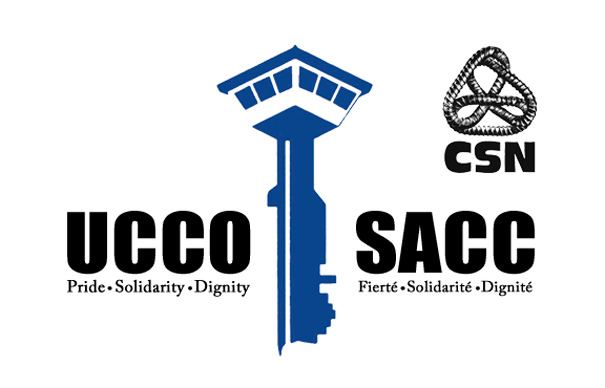As our country faces an important election period, we at the Union of Canadian Correctional Officers (UCCO-SACC-CSN) took the opportunity to question the various political parties on some of the issues our members face on a daily basis.
Here are their responses.
Note that the parties are listed in alphabetical order.
Conservative Party
- Prison Needle Exchange Program (PNEP)
Is your party aware of the federal Prison Needle Exchange Program? UCCO-SACC-CSN has long opposed it. What is your party’s stance on the possible discontinuing of this program, which, in our view, fails to promote rehabilitation of inmates struggling with addiction, and instead facilitates drug injection in an unsafe and uncontrolled environment?-
Yes, we are aware of the federal Prison Needle Exchange Program, and a Conservative government would move to eliminate it. We share the serious concerns raised by UCCO-SACC-CSN and believe the program undermines both the safety of correctional officers and the goal of true rehabilitation. Officer safety will always be our top priority. Rather than facilitating drug use in a controlled setting, we believe resources should be directed toward proven, secure, and structured addiction treatment programs that support recovery and reduce risk for both staff and inmates.
-
- Blood Samples Act
This legislation would allow a correctional officer to demand a blood sample from an inmate who has assaulted him or exposed him to his bodily fluids. Will your party support the adoption of the bill introduced in the 41st Parliament? This legislation would allow correctional officers to request a blood sample from an inmate who has assaulted them or exposed them to an inmate’s bodily fluids?-
This is a serious issue that merits careful consideration. The health and safety of correctional officers must be a top priority, particularly when they are exposed to potentially life-altering risks on the job. We are sympathetic to the intent behind this proposed legislation however further study is necessary to fully understand its legal implications and how it aligns with protections currently afforded to other frontline workers, such as police officers. If elected a Conservative government will ensure it receives a thorough and informed review.
-
- Inmate Accountability
Given the alarming rise in violence and the influx of hard drug use into our institutions without any notable consequences for inmates, what measures will your party take to make our institutions safer?
Managing the inmate population has also become increasingly difficult since the end of solitary confinement. How will your party intend to handle the Structured Intervention Units (SIUs) and Special Handling Units (SHUs) to ensure safe population management in our penitentiaries?-
A Conservative government will take decisive action to restore order, safety, and accountability in our federal institutions. The rise in violence and drug use behind bars is unacceptable, and we believe inmates must face real consequences for possessing or trafficking illegal substances. We will work with provincial attorneys general to review current policies and ensure that jailhouse charges—especially those involving violence or contraband—are pursued when appropriate and not dismissed as being “not in the public interest. “We are also committed to exploring the creation of a specific Criminal Code provision to address assaults against correctional officers in custodial settings, recognizing the unique risks you face every day. In terms of inmate population management, we will move swiftly to introduce a constitutionally compliant segregation framework that balances the rights of inmates with the need to protect staff and maintain order. We will review the effectiveness of Structured Intervention Units (SIUs)and ensure Special Handling Units (SHUs) are equipped to safely manage high-risk individuals. Our goal is to restore discipline and uphold safety as the cornerstone of Canada’s correctional system.
-
- Collective Bargaining
What is your party’s position on the right of federal correctional officers to engage in a distinct collective bargaining within the federal public service?
Will your party support UCCO-SACC-CSN’s demands to improve health, safety, and working conditions for correctional officers?-
Yes. A Conservative government will fully recognize the distinct and highly specialized role that federal correctional officers play within the Public Safety portfolio. The nature of your work—managing high-risk environments and ensuring the safety and security of institutions—is vastly different from that of the broader public service and deserves to be treated as such during collective bargaining. We are committed to respecting and maintaining your current right to choose a method of dispute resolution, and to ensuring that your voices are heard and your unique realities are acknowledged in all negotiations.
-
- Pensions
Federal correctional officers perform one of the most dangerous jobs in the country. Yet, their pension system is outdated and in need of review. The 2005 federal budget introduced an accrual rate of 2.33% for various groups, including correctional officers, but the government has still not implemented these changes. Will your party support UCCO-SACC-CSN’s efforts to modify the pension plan to reflect the high-risk nature of our work?-
A Conservative government will take this issue seriously. We recognize that federal correctional officers carry out one of the most challenging and high-risk public safety roles in Canada, and we believe their compensation and benefits should reflect that reality. We would work closely with UCCO-SACC-CSN to explore solutions that respect the unique demands of correctional work and ensure long-overdue updates to the pension system are thoroughly reviewed and considered.
-
- Opioid Crisis
The Correctional Service of Canada has signaled its intent to amend internal policy, including moving away from a zero-tolerance stance on drugs within our institutions. UCCO-SACC-CSN believes that this shift will inevitably increase the dangers faced by our members. Will your government ensure that inmates remain accountable for the use, possession, and distribution of illicit substances within federal institutions?-
A Conservative government will restore a clear and uncompromising zero-tolerance policy for illicit drug use, possession, and distribution within federal institutions. We strongly oppose any weakening of enforcement standards that would make correctional environments more dangerous for officers and less focused on rehabilitation. Our first priority will be to stop the flow of contraband—particularly opioids—into our institutions. This includes installing secure fencing around yards, entrances, exits, and vulnerable access points to prevent drone drops and other forms of smuggling. Organized crime has taken advantage of lax enforcement under the Liberal government, putting both staff and inmates at risk. We will make institutional safety a top priority and ensure accountability is restored across the system. We have also committed to require recovery oriented rehabilitation in prisons to ensure that serious offenders participate in evidence based recovery and treatment programs rather than the current Liberal programs that facilitate continued addiction.
-
Bloc Québecois
- Prison Needle Exchange Program (PNEP)
Is your party aware of the federal Prison Needle Exchange Program? UCCO-SACC-CSN has long opposed it. What is your party’s stance on the possible discontinuing of this program, which, in our view, fails to promote rehabilitation of inmates struggling with addiction, and instead facilitates drug injection in an unsafe and uncontrolled environment?- Answer: The Bloc Québécois has long been active in the fight against contraband in prison. We’ve been calling on the government for many years to crack down on the use of drones and cell phones in prisons. Drones have become one of the main means of smuggling contraband, including drugs, into prisons. We’re not against the prison needle exchange program, but we think it’s important to constantly study the impact of public policies.
- Blood Samples Act
This legislation would allow a correctional officer to demand a blood sample from an inmate who has assaulted him or exposed him to his bodily fluids. Will your party support the adoption of the bill introduced in the 41st Parliament? This legislation would allow correctional officers to request a blood sample from an inmate who has assaulted them or exposed them to an inmate’s bodily fluids?- Answer: Yes, we believe it is important to protect the health of correctional officers and that an inmate who assaults or exposes an officer to fluids should be required to provide a blood sample.
- Inmate Accountability
Given the alarming rise in violence and the influx of hard drug use into our institutions without any notable consequences for inmates, what measures will your party take to make our institutions safer?
Managing the inmate population has also become increasingly difficult since the end of solitary confinement. How will your party intend to handle the Structured Intervention Units (SIUs) and Special Handling Units (SHUs) to ensure safe population management in our penitentiaries?- Answer: We intend to let Correctional Services Canada manage these units. However, we believe that the safety of officers and other inmates must come first. As with all public policies, we are open to studying the impacts and making improvements where necessary.
- Collective Bargaining
What is your party’s position on the right of federal correctional officers to engage in a distinct collective bargaining within the federal public service?
Will your party support UCCO-SACC-CSN’s demands to improve health, safety, and working conditions for correctional officers?- Answer: Yes, we believe it’s important to consider the particularities of correctional officers.
- Pensions
Federal correctional officers perform one of the most dangerous jobs in the country. Yet, their pension system is outdated and in need of review. The 2005 federal budget introduced an accrual rate of 2.33% for various groups, including correctional officers, but the government has still not implemented these changes. Will your party support UCCO-SACC-CSN’s efforts to modify the pension plan to reflect the high-risk nature of our work?- Answer: Yes, we’ve always supported the importance of providing a fair and equitable pension plan for federal employees.
- Opioid Crisis
The Correctional Service of Canada has signaled its intent to amend internal policy, including moving away from a zero-tolerance stance on drugs within our institutions. UCCO-SACC-CSN believes that this shift will inevitably increase the dangers faced by our members. Will your government ensure that inmates remain accountable for the use, possession, and distribution of illicit substances within federal institutions?- Answer: We believe it’s important to fight against drugs, but we must also work to reduce the transmission of infection and disease. In our view, a balance needs to be struck, for example, by providing care for drug users without aiming for repression, while at the same time cracking down on those who introduce or distribute drugs.
Liberal Party
Answers will be published as soon as we receive them.
New Democratic Party (NDP)
Answers will be published as soon as we receive them.

